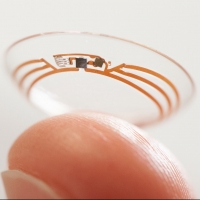Google Introduces Smart Contact Lens That Reads Glucose Levels

Google announced through its official blog that it is in the process of developing a smart contact lens that can measure glucose levels through tears. The wearable device would help people with diabetes keep track of their blood sugar levels without having to prick their fingers, which is required for most glucose monitors.
The prototype has a glucose sensor the size of a fleck of glitter that is embedded between two layers of soft contact lens material. A pinhole in the lens lets tear fluid seep over the glucose monitor to get readings about once every second. This easy, automatic method could help improve the health of millions of people living with diabetes.
“We’re also investigating the potential for this to serve as an early warning for the wearer, so we’re exploring integrating tiny LED lights that could light up to indicate that glucose levels have crossed above or below certain thresholds,” Google’s blog post says.
The lens features a tiny wireless chip with an antenna and controller that can send the information gathered from the glucose sensor to a device such as a handheld monitor or an app on a phone.
With the concern today about the security of wireless devices and the data they collect, there have been questions about how Google plans to handle people’s sensitive medical information. Joseph Lorenzo Hall, chief technologist at the Center for Democracy & Technology, said Google assured him the data would not be added to the collection of personal information the company gathers from its other services.
“The data will never hit Google’s servers,” he told The Washington Post. “That’s a forward-thinking affirmative claim that they’re making. That is important.”
Of course, the futuristic lenses have attracted attention from outside the medical community as well. The possibility that these could be the next step in wearable technology after Google Glass holds a lot of potential. Having a sensor that sits directly on your iris instead of in front of your eyes like glasses has several advantages, such as a wider field of vision, the ability to detect biometric data, and—let’s be honest—not looking so dorky.
Google says it will be at least five years before its smart contact lenses will be available to consumers. But it’s exciting to think about what this innovation could mean for people’s lives in the future.

